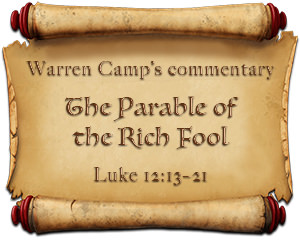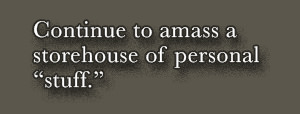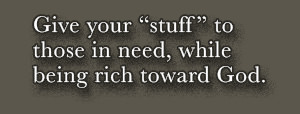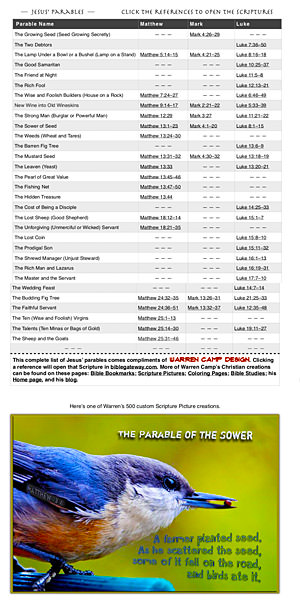
In this “Wisdom and Folly” parable, Jesus depicts the futility of the belief that wealth can secure prosperity or good life, and help admit one’s access to heaven.
He tells this parable to warn about greed and to illustrate his point that “one’s life does not consist in the abundance of possessions.”

† Find Warren’s short summary at the bottom of page.
Five Common Regrets of the Dying
(1) “I wish I’d had the courage to live a life true to myself.”
(2) “I wish I hadn’t worked so hard.”
(3) “I wish I’d had the courage to express my feelings.”
(4) “I wish I’d stayed in touch with my friends.”
(5) “I wish I’d let myself be happier.”
. . .
Q. Is it possible to die with zero regrets?
A. That’s hard to know for certain. But what we do know is clearly expressed in the Scriptures: Storing up “stuff” for ourselves is a dead end. True riches come from a life invested in God!
Option 1. . .

or,
Option 2 . . .


Click the list or the “bird” to enlarge and use Warren’s list of forty-four of Jesus’ parables (a PDF file with links to Scriptures).
Start Reading Warren’s Commentary . . .
Find his summary at the bottom.
par•a•ble [noun] a simple story used to illustrate the meaning of or a moral or spiritual lesson, as told by Jesus in the gospels
synonyms: allegory, moral story/tale, fable
Jesus’ Parable of the Rich Fool
Luke 12:13–21
Found only in Luke’s gospel, the Parable of the Rich Fool is introduced by a member of the crowd listening to Jesus, attempting to enlist his help in resolving a family financial dispute. The story deals primarily with wise stewardship and its responsibilities. This parable also includes the famous slogan, “Eat, drink, and be merry.”
Jesus’ story involves two anonymous men: one man’s focus is on self-centeredness while the other’s is on selfishness; one of the men suffers from greed. See if you determine which man was the greedier one and why.
In this parable, a rich farmer had more crops than he knew what to do with. His existing barns couldn't accommodate the abundance of produce he'd amassed, so he built bigger barns in which he planned to store his exorbitant amount of produce. He felt this would maximize his income potential by allowing him to wait for substantial price increases before selling his commodities. St. Augustine wrote that the farmer was “planning to fill his soul with excessive and unnecessary feasting, and was proudly disregarding all those empty bellies of the poor. He did not realize that the bellies of the poor were much safer storerooms than his barns.”
The rich farmer’s foolishness is particularly evident in the fact that wealth cannot guarantee the future: the day of judgment will arrive sooner than he expected.
The Parable of the Rich Fool
A Parable of Wisdom and Folly
Jesus speaks the “Parable of the Rich Fool” to the crowd (Luke 12:13–21).
This parable speaks loudly to our generation. It tells us “how to define life.” Most people define life in terms of material possessions (“stuff”), physical fitness, or the future.
Let’s begin our analogy of this parable by putting it into context. Jesus, in Luke’s preceding chapter (11:47–51) talks about how the Jewish religious leaders always killed God’s messengers. He then teaches his disciples in 12:4 not to be afraid of those who’ll kill the physical body but to fear God who has authority over their souls and can throw them into hell (12:5). In 12:8–9, he reminds his disciples of judgment day’s final accounting in the after-life. In addition, he tells them not to feel anxious or afraid when those prophet killers drag them into the courts of justice.
The Parable of the Rich Fool
Someone in the crowd said to him, “Teacher, tell my brother to divide the inheritance with me.”
14Jesus replied, “Man, who appointed me a judge or an arbiter between you?” 15Then he said to them, “Watch out! Be on your guard against all kinds of greed; life does not consist in an abundance of possessions” (12:13–15).
We see in the opening verse that one unnamed man in the crowd demanded this of Jesus: “Teacher, tell my brother to divide the inheritance with me.” The man was worried about his physical, financial gain. Filled with greed, he wanted Jesus to mediate a financial matter between him and his older brother. It was the law in Jesus’ day that a father’s inheritance would be divided between the sons, such that the older, first-born son (if there were only two sons) was to receive a portion that was twice as much as the younger son’s; that amounted to two-thirds and one-third for the two sons. More than likely, the brother who was addressing Jesus wasn’t the firstborn and was asking for an equal share of the inheritance, feeling entitled to a larger share of his father’s estate than what the law allowed. Add to that the fact that he’d pleaded for a favorable ruling from Jesus, as a result of the apparently recent passing of his father. But Jesus refused to arbitrate their dispute.
You might wonder: Why is Jesus telling this parable about the rich farmer, who was acting selfishly, to the younger, self-centered brother? Jesus built up the rich man’s character; he was the total opposite of the greedy brother. Yet, both men felt that life consisted in possessing “stuff.” And the greedy brother treasured riches more than his familial relationship with his older brother.
16And he told them this parable: “The ground of a certain rich man yielded an abundant harvest. 17He thought to himself, ‘What shall I do? I have no place to store my crops’” (vv. 16–17).
Jesus proceeded to tell the younger brother the Parable of the Rich Fool, in which he was told that a rich farmer had more than enough for himself. At this point in the parable, he had a bumper crop. (Alas: The rich get richer and the poor get poorer?) Readers of the text might get the impression that the rich man didn’t really work very hard for this. Why might Jesus want us to get that impression? If you get something that you didn’t work for, what is it? It’s a gift. From whom did your gift come? It came from God.
To learn what the rich farmer did with his abundant surplus, look at v. 17a above. The rich farmer “thought to himself.” In that culture, everyone went to the city gates to discuss their personal and financial situations; they didn’t contemplate them on their own. Because of that, we might sense that the rich farmer lacked friends or people with whom he could discuss this pressing matter.
He asked himself in v. 17b, “What shall I do? I have no place to store my crops? . . . This is what I’ll do: I will tear down my barns and build larger ones, and there I will store all my grain and my goods.” Notice the emphasis on “I” and “my” as he reasoned with himself. Everything was about him; nothing had to do with God. He didn’t understand that his prosperity was a gift from God. He forgot that he was a steward of the acquisitions God had brought to him, and he thought that he was the outright owner of it all. The man’s problem wasn’t that he had treasure on earth but that he wasn’t being rich toward God.
18“Then he said, ‘This is what I’ll do. I will tear down my barns and build bigger ones, and there I will store my surplus grain. 19And I’ll say to myself, “You have plenty of grain laid up for many years. Take life easy; eat, drink and be merry.’
20“But God said to him, ‘You fool! This very night your life will be demanded from you. Then who will get what you have prepared for yourself?’ (vv. 18–20)
Starting in v. 18, Jesus tells us the rich farmer’s plan to enable him to store his abundance of “stuff.” Making his long-term plan, he assumed that he’d live for a long time and perpetually enjoy his numerous possessions. God disapproved of the rich man’s shortsightedness, causing the man to die that very night, leaving all his riches behind. In v. 20, God made his entrance, calling the rich man a fool and warning him, “This very night your life will be demanded from you.” The word “demanded” has the connotation of paying back a loan; it emphasizes the idea that the rich man was only a steward, not the owner of all his stuff.
God went on to ask him, “Then who will get what you have prepared for yourself?” Do you see the similarity between the greedy brother’s question and the basis of this parable? The greedy brother’s question dealt with the result of his inheritance (as a result of his father’s death) while the parable ends with the ultimate question of inheritance (as a result of the rich man having died). Jesus’ question lingered on the rich farmer’s mind: “Who will inherit what you’ve collected?” We know what will happen. We see it happening with the greedy man.
The parable’s closing verse can be seen as the rich man’s epitaph.
“This is how it will be with whoever stores up things for themselves but is not rich toward God” (v. 21).
See the major reversal in this parable! The rich farmer ended up being poor to God.
Looking back at what brought Jesus to the point of telling this parable about a rich man to a bunch of poor people, we ought to wonder: “How did a rich man’s story go over with the people who heard it? Invariably, as a result of jealousy, poor people want bad things to happen to rich people. The greedy man’s question fits well in the context of Jesus’ “wisdom and folly.” It certainly shows that the greedy brother wasn’t paying any attention to what was being said. Verses 15 and 21 introduce and conclude the parable with the same thought: Man’s life does not consist of “stuff.”
A Hearty Way to Approach and Apply This Parable
The point of the Parable of the Rich Fool is twofold. First, we’re not to devote our lives to gathering and accumulating wealth. We see it all the time in people who are singularly devoted to the accumulation of wealth. What happens to all that wealth when they die? It gets left behind to others who didn’t earn it and won’t appreciate it. Furthermore, if wealth, money, or the accumulation of “stuff” is your master, that means that God isn’t your Master (Matthew 6:24).
Secondly, we aren’t blessed by God to hoard our wealth for ourselves. Instead, we’re blessed to be a blessing in the lives of others while also being blessed to help build the kingdom of God by witnessing to others the importance of God in our lives. Psalm 62:10 tells us that if our riches increase, we aren’t to set our hearts upon them; Proverb 11:24 advises us that the one who gives freely grows all the richer; and Proverbs 3:9–10 encourages us wisely to honor God with the firstfruits of our increases. Clearly, when we honor God with what he’s given us, he’ll bless us with more and enable us to honor him with more of what he’s provided to each of us.
Have you been defining life in your house, your circle of friends, your stock portfolio, and so on, in terms of what you can do physically, or with the assumption that you’ll live much longer? What’s going to happen when you lose one or more of those things? What happens when you become physically challenged? Can you tolerate the long-term aftereffects of a stock market crash? How about when you find out that you or a loved one have only six months to live?
If you define life according to any of those things, you’ll be devastated. So, two questions are to be answered now: (1) What do you choose to prioritize and (2) what do you choose to treasure?
My answer for both questions: Because we cannot take our material possessions with us, we should concentrate on storing up eternal treasures that we’ll use and fully appreciate in heaven. John Wesley taught and lived wisely regarding riches. He said that you should “earn as much as you can, save as much as you can, and give as much as you can.”
So, if God has blessed you with material wealth, act carefully and wisely: “Set not your heart on it,” instead “be rich toward God.” That’s the wisdom message of the Parable of the Rich Fool.
How do we become rich toward God? Primarily, we do that by sacrificially giving to people in need (Luke 12:33; 18:22; and 1 Timothy 6:17–19), and by trusting in Jesus for each of our individual needs (Revelation 3:17–18).
Question 1 How pervasive is the attitude, “Take life easy; eat, drink, and be merry” (v. 19) in our society? How can this attitude affect your relationship with God (v. 21)?
Question 2 In what way(s) can you be “rich toward God”?
Question 3 What’s the lesson for you from this parable?
“Watch out! Be on your guard against all kinds of greed; life does not consist in an abundance of possessions” (Luke 12:15b).

Take our “Parables Quiz.”
See Warren’s other “Parables of Jesus” commentaries.
— Warren’s Concise Summary —
The Parable of the Rich Fool tells of a wealthy man whose land produces an abundant harvest, prompting him to build bigger barns to store his goods and plan for a life of ease. However, God calls him a fool, declaring that his life will end that very night and questioning who’ll inherit his stored wealth.
The parable serves as a warning against greed and the foolishness of relying on material riches instead of being “rich toward God,” emphasizing that true life and security are not found in possessions but in a right relationship with God.
